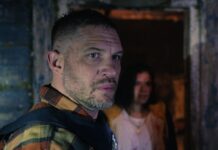

Danny Boyle (centre) with Irvine Welsh (left) and Ewan McGregor (right) created an all-time great (Image: Getty)
It was supposed to be “unfilmable” and a “foolhardy” choice for a second film from a team who had exploded on to the scene two years earlier. But the result could not have been better as the film became an instant classic which regularly features in lists of the best films of all time and was even voted the best British film of the last 90 years.
Trainspotting was released in 1996, “supercharged with sulphurous humour and brutal recklessness”, according to a Guardian review 20 years later which also said it was “maybe the only successful 90s British attempt at answering films like Goodfellas or Pulp Fiction” which “has a version of their spirit and power and matches them for hardcore violence, horror and drugs”.
The film was directed by Danny Boyle and based on a book by Irvine Welsh, which was adapted for the big screen by John Hodge’s screenplay. Its cast became household names whose careers became spectacularly successful — think Ewan McGregor (Renton), Robert Carlyle (Begbie), Jonny Lee Miller (Sick Boy), Ewen Bremner (Spud) and Kelly McDonald (Diane).

Choose life: Ewan McGregor as Renton in the film’s iconic opening scene (Image: Channel 4)
The film follows a group of heroin addicts in Edinburgh and especially Renton’s attempt to escape addiction while also plotting to steal a large amount of money to set him up with the new life he has planned for himself. The film’s now-legendary opening scene sees Renton and the kind-hearted Spud racing down Edinburgh’s main route, Princes Street, while Renton’s “choose life” monologue runs over Iggy Pop’s Lust For Life hit.
The film came two years after Boyle, Hodge and producer Andrew Macdonald had released Shallow Grave, which was described as “a breath of fresh air through a beleaguered British film industry” and was a lot to live up to. But a BBC review after Trainspotting’s release said the film “had that rare quality of exceeding all expectations”.
Listing it at number 74 in their list of the best films ever made, Empire says: “For their follow up to the superb Shallow Grave, Danny Boyle, Andrew Macdonald and John Hodge foolhardily elected to film the supposedly unfilmable: Irvine Welsh’s scrappy, episodic, multi-perspective novel about Edinburgh low-lives.
“The result couldn’t have been more triumphant: the cinematic incarnation of ‘Cool Britannia’ came with a kick-ass soundtrack, and despite some dark subject matter, a punch-the-air uplifting pay-off.”
In 2024, it was voted the best British film of the last 90 years in a poll to mark the 90th anniversary of the British Council. In 1999 it placed 10th on the top 100 British films of the 20th century and in 2004 it was voted the best Scottish film of all time.

Ewan McGregor as Renton, Jonny Lee Miller as Sick Boy and Robert Carlyle as Begbie in Trainspotting (Image: Channel 4)
Author Irvine Welsh had heroin addiction issues
The book, Trainspotting, was released in 1993 and has been voted the 10th best book of the 20th century. There have, in fact, been five instalments in the “Trainspotting series”, though only one reached the stratospheric levels of fame the first, which is reportedly the “most-shoplifted” novel ever.
Author Irvine Welsh became addicted to heroin in his early 20s and was addicted for around 18 months before going cold turkey (as Renton does in the film) and beating the addiction. He has described it as “awful” but also explained the appeal of the drug to so many people, saying it gives a “tremendous sense of wellbeing” and a “feeling of invincibility”.
He added: “The good thing about heroin, and the worst thing, is not having to deal with other people. Of course, it’s a complete delusion.”

Trainspotting author Irvine Welsh in 2010 (Image: Daily Record)
Why is it called Trainspotting?
A question that is often asked is why the film, which is about drug addiction in Edinburgh and doesn’t feature any trains, was called Trainspotting in the first place. It is reported to be a reference to an episode from the novel where Begbie and Renton meet “an auld drunkard” in a disused railway station who asks them if they are “trainspotting”.
According to IMDB, author Welsh has explained that when he was growing up in Edinburgh there was an abandoned train station that had become a place frequented by the homeless and drug-addicted, who, when going to the station to take drugs, would often say that they were going “trainspotting”.
A film that’s ‘impossible to quit’
Trainspotting has a 90% score on Rotten Tomatoes and 8.1 out of 10 on IMDB. Kevin Maher, writing in The Times, says it is “easy to start, all-consuming, impossible to quit”. Jay Carr in the Boston Globe says it as “unsinkable vigour coursing through [its] veins”, while Chris Cabin in Slant Magazine says “the film finds pitch-black humor, horror, tragedy and violence in a series of asides and digressions”.
However, David Goodman, writing for Associated Press, said: “Trainspotting is too morally bland for the ugliness it depicts. It’s yet one more movie with the subtle, destructive message that it’s not so terrible to do bad things, as long as they’re carried off in a stylish, amusing way.”
Trainspotting is streaming now on Amazon Prime Video, Apple TV, Google Play, YouTube and Sky Store from £2.49.















